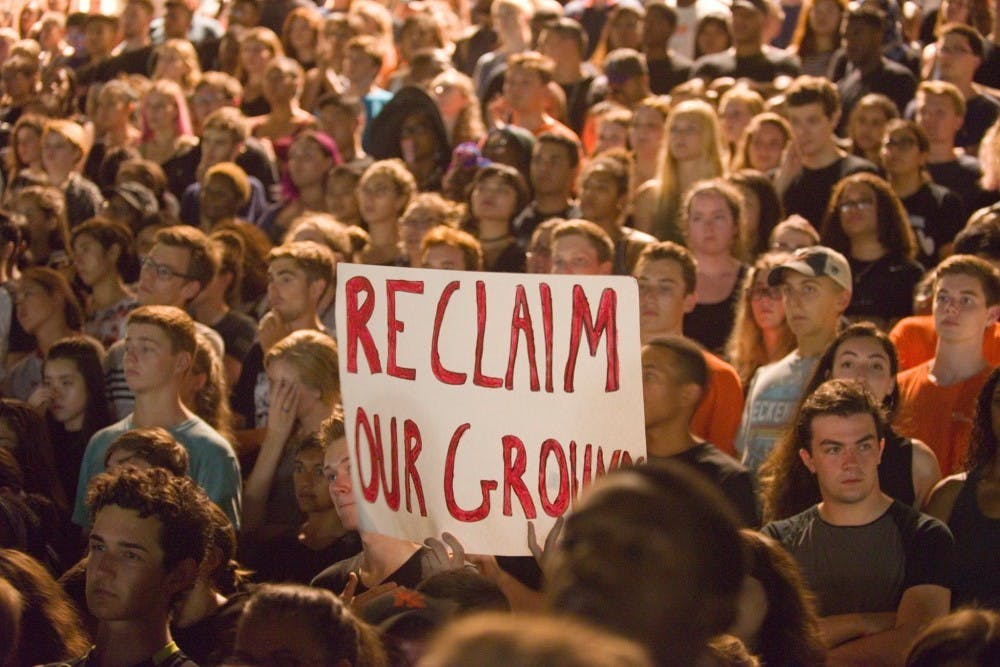The moment I stepped on Grounds for the first time as a student, I discovered the deep intellectual diversity which blossoms at the University. Embodied in the numerous Contracted Independent Organizations on Grounds, the combination of dialogue and the numerous students from backgrounds spanning the globe was true cognitive diversity. Ironically, this diversity gave the University a sense of unity as a community bound together in learning new ideas. Bridges spanning political or ideological differences could be built here.
Unfortunately, I only discovered such unity for a brief period in my second semester as a first-year student. Prior to arriving on Grounds in January, I spent my first semester abroad at Regent’s University London through the University’s inaugural “London First” program. It was during this time that I witnessed the stark opposite of unity at our University in the wake of the first ‘Unite the Right’ rally.
As my fellow students and I delved into our studies surrounding London, we saw the lasting impacts of Aug. 11 and 12 on the University community from an ocean away. Being so disconnected from our peers allowed us to grasp the situation from a larger point of view, like stepping away from a painting to view its entirety. We reacted as the rest of the world reacted, often meeting to discuss the issue and its impacts on the reputation of Charlottesville. Nothing is quite as unforgettable as seeing the face of Heather Heyer and her murderer on British newspapers or televisions throughout London, associating our University and the City of Charlottesville with what both swore to stand against: racism in America.
Among the good things we saw were the ways the community came together in remembrance of Heather Heyer and law enforcement officers Lt. H. Jay Cullen and Trooper-Pilot Berke M.M. Bates. As we continue to honor their memories, they each leave a lasting legacy as powerful testimonies to the importance of resisting hate and seeking civility.
Among the bad things we witnessed was the clear division within the student body. Such division became immediately apparent during the student town hall hosted by Student Council and subsequent meetings. For meetings supposedly centered on listening, not much listening occured. Instead of students partaking in fruitful discussion surrounding the demands put forth during the March to Reclaim Our Grounds, only heated arguments and ad-hominem attacks ensued, including claims of racism against fellow students rather than rebuttals against their ideas. These signs of division only continued throughout the first semester.
Instead of unification, from the other side of the Atlantic I witnessed division. Instead of civility, I witnessed attacks on character rather than ideas, which I later experienced at the University as well. Instead of the University moving forward as a whole, I saw parts of the community left behind.
A year later, these fault lines returned as the anniversary of the ‘Unite the Right’ rally passed by. While no white supremacist groups turned out in Charlottesville this year, division within the student body spiked again. For a second year, I witnessed attacks on the character and intelligence of students rather than arguments against their ideas. Whether these attacks occurred over social media or in Charlottesville, I did not have to be an ocean away to see it clearly this time.
If our community truly desires to move forward, we must do so together. We will never resolve any problems we face if we attack or degrade other students who may disagree with us. This tactic only results in the standstill or even inflammation of the problem. The University is meant to be a safe place to exchange ideas, discuss solutions and pave a way ahead for our community. If we cannot achieve these ends, we have failed as an institution of education.
While my cohort in London shared disagreements, we were never afraid to voice our opinions and discuss our ideas. We never went after the character of another student, nor did we ever dismiss someone because of their beliefs. Much like the city around us, we put aside our differences, focused on what we agreed on, discussed what we did not agree on, all while remaining civil and understanding — and it worked. We learned more about the issue, and more about each other.
I have the utmost faith in the students at our University. I know that while we may be shaken by the events of August, we are not afraid. The students I have come to know and love are brave and sharp. Let us recognize that the true enemy is racism — not each other. In this manner, let us direct our energy towards ensuring the worldview of white supremacy is dissolved ultimately. We here at the University all agree no one is worth more or less by the color of their skin. This is the common ground we can move forward upon, and to triumph over racism, we must use it.
Free communication of ideas is key to this process. Only by forging better ideas together will we replace the bad ones.
Matthew Nalls is the Communications Director for the College Republicans and a Contributing Guest Columnist for The Cavalier Daily. He can be reached at opinion@cavalierdaily.com.





